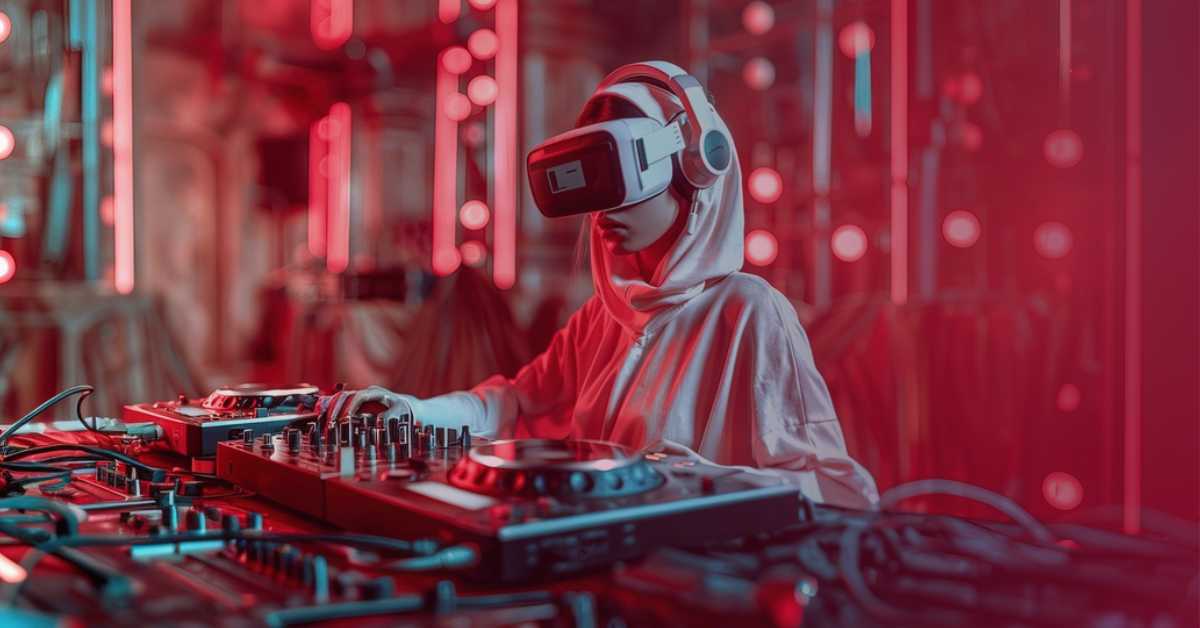A Quiet Revolution with Resounding Implications
AI and the music industry are two terms that any involved individual or conglomerate would not expect to see in the same sentence. That is not quite the case at present, though. This transformation isn’t a sudden upheaval but a gradual infiltration of AI into every stage of music creation, production, and distribution. The effects, though subtle, are profound for labels, producers, and artists of all sizes.
The New Producers: AI in Creation
Traditionally, music production has been a human-centric endeavor fueled by creativity and intuition. However, AI is now making inroads into this domain. AI-powered tools can:
- Generate music autonomously: Platforms like Suno AI and OpenAI’s Jukebox can create original songs in various styles based on user input.
- Suggest melodic modifications: Software features like Landr’s “mastering AI” analyze and suggest adjustments to a song’s melody, rhythm, and overall structure.
- Craft entire compositions: AIVA, an AI music platform, creates original soundtracks for film and media, demonstrating the potential for complete AI-driven composition.
These capabilities offer both opportunities and challenges:
- Cost Reduction for Labels: AI presents a tantalizing prospect of significantly reduced production costs for major labels. Traditionally, a large portion of an album’s budget goes towards human talent – musicians, producers, and engineers. AI can potentially automate many of these tasks, allowing labels to produce more content at a lower cost.
- Democratization for Smaller Producers: AI tools can be a game-changer for smaller producers. Platforms like BandLab with “Songstarter” allow users to generate musical loops and ideas with various genres, providing a cost-effective way to create professional-sounding music. However, the over-reliance on AI could lead to homogenization and a lack of distinctive sound.
While GAudio Studio’s current focus isn’t on music generation, it exemplifies another way AI impacts music production. This platform utilizes AI for advanced audio processing tasks such as:
- Instrument Separation: Musicians and producers can isolate specific instruments from existing songs, allowing for remixing or creating unique acapella tracks.
- Vocal Removal: Singers can use this feature to practice singing along to their favorite songs without the original vocals.
Artists: Empowerment or Replacement?
For artists, AI presents a double-edged sword:
- Enhanced Creativity: Songwriters can leverage AI tools to flesh out melodies and harmonies, bringing their musical ideas to life more easily. This empowers particularly independent musicians who may need access to expensive studios or collaborators.
- Existential Threat: The fear of AI replacing artists entirely is a growing concern. What value does a human artist bring if machines can churn out chart-topping hits? While unlikely soon, this fear highlights the importance of the human touch and the unique emotional connection artists bring to music.

Case Study: Taryn Southern & Amper Music
In 2017, independent singer-songwriter Taryn Southern collaborated with Amper Music to create her single “Break Free.” Southern used Amper’s AI to generate musical ideas and refine her melody, showcasing how AI can augment the creative process for human artists.
Labels: Between Innovation and Control
For music labels, AI presents a powerful tool for:
- Predicting Trends: Sophisticated algorithms can analyze vast amounts of data to predict upcoming musical trends more accurately. This allows labels to tailor their strategies and discover breakout artists before the competition.
- Targeted Marketing: AI can be used to personalize music recommendations and marketing campaigns, reaching specific demographics with a laser focus. This targeted approach can increase engagement and conversion rates.
- Consolidation of Power: While AI can empower smaller labels by helping them identify overlooked niches, the most prominent labels have the resources to leverage AI more extensively, potentially increasing their dominance in the industry.
However, navigating this power dynamic requires a delicate balance:
- Maintaining the Human Touch: While AI can streamline processes, labels must recognize the importance of human curation and artistic vision. The music industry thrives on originality and emotional connection, qualities that are difficult to replicate with algorithms.
AI’s Effect on Streaming Platforms and Distribution Platforms
The impact of AI goes beyond creation and production:
- Personalized Playlists: Streaming platforms like Spotify and Apple Music use AI to curate personalized playlists for individual users. These playlists analyze listening habits and recommend similar artists and songs, creating a more engaging listening experience.
- Algorithmic Bias: However, AI algorithms can be biased based on the data they are trained on. This can lead to overrepresenting specific genres and artists, potentially stifling musical discovery. Platforms need to be transparent about their algorithms and actively work to mitigate bias.
- Automated Content Moderation: AI can be used to flag and remove copyrighted material or inappropriate content from streaming platforms. This helps maintain a safe and legal listening environment but can also lead to censorship concerns. Platforms need to ensure a balance between protecting rights and allowing artistic freedom.
- Targeted Distribution: Distribution platforms can leverage AI to optimize music distribution strategies. AI can identify the most effective channels to reach a song’s target audience by analyzing market trends and user preferences. This can be particularly beneficial for independent artists struggling to reach a wider audience.

Case Study: Unchained Music – AI Distribution for the Independent Artist
Unchained Music, founded in 2012, is a digital music distribution platform dedicated to empowering independent musicians. They provide a unique solution that tackles the age-old challenges independent artists face to reach a global audience: expensive traditional distribution channels and a need for more transparency.
The Challenge: Breaking through in the music industry can be daunting for independent artists. Traditional distribution channels are often cost-prohibitive and have complex requirements. This creates a significant barrier for talented musicians to hear music on major streaming platforms like Spotify, Apple Music, and TikTok.
The Unchained Music Solution: Unchained Music leverages artificial intelligence (AI) to dismantle these barriers and offer a three-pronged approach:
- Free Global Distribution: Unchained Music eliminates the financial hurdle by offering free distribution to a vast streaming platform network. This allows independent artists to get their music out without any upfront costs.
- AI-powered Marketing and Promotion: Unchained Music goes beyond distribution. Their AI analyzes streaming data and listener preferences to generate targeted marketing campaigns and suggest strategic promotional avenues for each artist’s music.
- Data-Driven Artist Insights: Artists gain access to a comprehensive analytics dashboard powered by AI. This dashboard provides valuable insights into listener demographics, streaming trends, and performance data across various regions and platforms. With this data, artists can make informed decisions about their music and tailor their future releases for maximum impact.
The Benefits for Artists: Unchained Music’s AI-powered approach offers a multitude of benefits for independent musicians:
- Increased Visibility: Free global distribution and targeted marketing campaigns significantly increase an artist’s chances of being discovered by a wider audience.
- Data-driven Decision Making: Artists can leverage AI-powered analytics to gain valuable insights and make informed decisions about their music and marketing strategies.
- Focus on Creativity: By eliminating distribution costs and streamlining promotion, Unchained Music allows artists to dedicate their time and resources to what they do best – creating great music.
The Impact: Since its inception, Unchained Music has empowered over 23,000 artists to distribute their music globally. The platform boasts success stories of independent artists who have achieved significant recognition and even landed major label deals. Unchained Music’s model is a testament to AI’s power to democratize access to the global music market for independent artists.
Ethical and Cultural Implications
The rise of AI in music raises several ethical and cultural considerations:
- Data Privacy: As streaming platforms and labels collect more data about listener preferences, concerns around data privacy become paramount. Users deserve transparency about how their data is used and control over who has access to it.
- Bias and Cultural Homogenization: AI algorithms trained on existing music data can perpetuate existing biases within the music industry. This can lead to a lack of diversity and a homogenization of musical styles. Efforts must be made to ensure AI promotes musical discovery and representation across different cultures.
- The Future of Artistry: The widespread use of AI in music creation challenges our definition of artistry. Will the future musician be a composer or a curator of AI-generated music? The key is to find a balance where AI augments and enhances human creativity, fostering a future of artistic collaboration rather than replacement.
Conclusion
The integration of AI in the music industry is undeniable. It offers many tools for creation, production, and distribution, democratizing music creation and offering valuable insights for labels and platforms. However, it is crucial to navigate this new landscape responsibly. AI should empower human creativity, not replace it. Transparency, ethical considerations, and a focus on the human touch will ensure that AI contributes to a vibrant and diverse musical future.
Our platform in Asia Live 365 is your gateway to discovering independent and rising artists, exclusive interviews, and in-depth music features, all focused on the diverse soundscapes of Asia.






